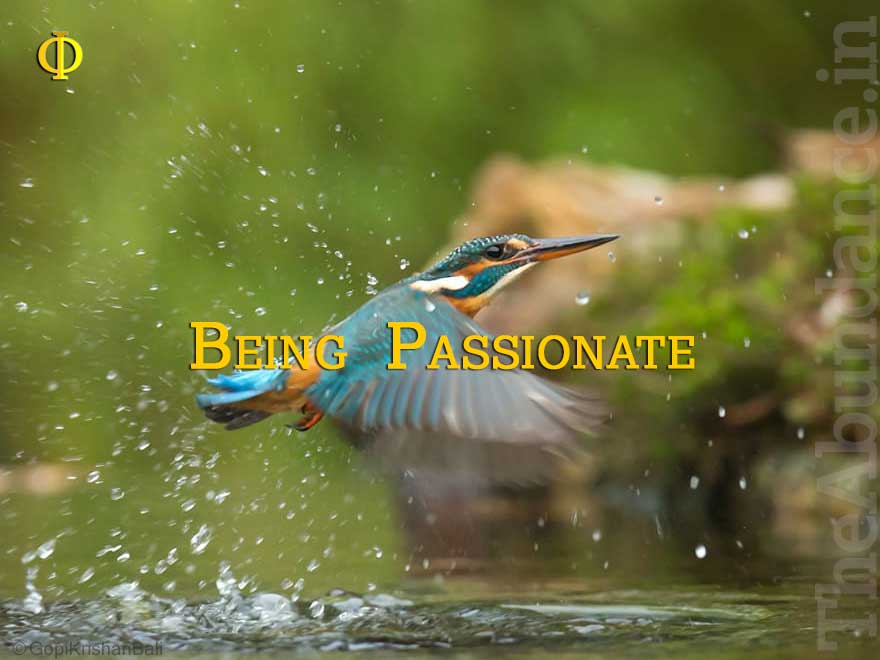Passionate individuals are always focused on ‘What can be rather than what is‘. They’re always chasing their dreams and the next goal with the unwavering belief that they’ll achieve it.
The Source, The Abundance Lab
PASSION usually is defined as a strong liking or desire for or devotion to some activity, object, or concept. For conscious individuals, passion is a value that holds significant meaning to them or an activity that they enjoy doing. When we practice or follow our passion(s), we might feel joyous, content and mentally relaxed. As a professional, pursuing your passions as a career choice – as a profession – can bring you greater success, along with worldly achievements or emotional /social fulfillment w.r.t. the contributions we make in the society and/or at workplace.
The main characteristics of an individual who is passionate is self-awareness, and self-realization. It enhances when we know the purpose of our life/work, and participate in creating a social eco-system. Passionate people are consciously aware of the present skills, their mental abilities, their emotional attachments and they unite their passion + potential with their profession for their holistic well-being and exponential growth.
Is Passion a skill that can be developed?
Yes, PASSION is an important behavioral skill and the foundational element of our personality. If enthusiasm and passion are present, people tend to be more resilient when encountering obstacles. People who are passionate about what they do, rather than just “in it for the money,” tend to be people who have more positive outlooks and can overcome difficulty through problem-solving. We all have innate ability to explore and know it, learn it, understand it and apply it in our life or at workplace for 100xSuccess.
How to Explore the PASSION?
Here are some ways to explore your passion:
- Being Self-Aware: Maintain a sense of open perspective. When in difficult situations – ASK yourself,
“How big is this problem really?” and
“What do I need to do?” or “How I can resolve the issues?”
Remember not to blow things out of proportion or escalate it further, remind yourself of the good in your life and that things really will change. - Choose Consciously: Recognize that you always have a Choice in how you handle challenges. You can’t control what happens to you, but you can choose how you respond. You can choose to react to challenges and problems with hope and a positive attitude.
- Accept The Change: Change and uncertainty are part of life. When you accept this, you’ll be better able to adapt the change with openness and apply flexible approach in resolving it.
- Being Optimistic: Anticipate Challenges by focusing on the positive ways in which you can meet them rather than possible negative outcomes. This will help you feel more in control and less overwhelmed.
- Calm The Mind: Learn how to Calm Yourself First. When you feel yourself reacting to a challenge with escalating stress and anxiety, take steps to calm yourself (deep breathing, replacing negative thoughts).
- Let Go of Your Anger/Frustation: A difficult challenge can cause us to feel angry and upset. These feelings are normal, but they won’t help us move forward. Work through your anger and try to let go of negative feelings by writing about them or talking with a trusted friend.
- Face the Fears: Overcome Your Fear. All of us feel fear, especially when we’re faced with a change. But fear can hold us back from new experiences and opportunities for growth. If you are faced with a challenge that feels scary or overwhelming, start with the simplest thing you can do that takes you in the direction you want to go. Ask yourself, “What’s the smallest thing I can do to get started?” Once you’ve thought about it, do it.
- Take Timely Action: Avoid dwelling on problems. Focus on solutions instead. Figure out what you can do and then do it, one step at a time.
- Learn to Laugh: Be Happy and Laugh a lot. Even when things seem to be falling apart around you, try to find time to smile and laugh. It’s very healing and it will help you forget your worries for a few moments. Rent a movie that makes you laugh or spend time with a friend with a good sense of humor.
~Draft Post
Passion in life is important because it can help you achieve success in your career. If you’re passionate about what you do, you’re more likely to put in the extra effort to get the job done right. Passion can also help you stay motivated and focused on your goals.
Passion for work is the intense enthusiasm and excitement for what you do. It can bring the difference between just doing it and getting work done well. It can also bring the difference between simply enjoying your job or always struggling with it.



No responses yet